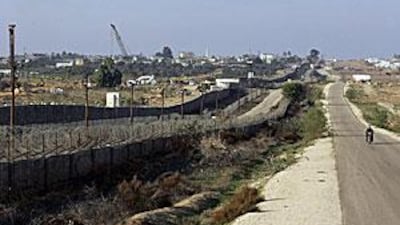CAIRO // The Egyptian government has begun construction on a subterranean steel wall along the country's border with the Gaza Strip, according to reports from the border. The BBC reported yesterday that the wall, which was designed by the US military, will reach about 18 metres into the ground in order to block as many as 1,000 tunnels that now allow goods and people to flow from Egypt into the Gaza Strip, which has been blockaded by Israel since 2007.
The Egyptian government has denied building the wall, Al Shorouk daily reported yesterday. According to the BBC, however, Egypt's steel wall with the Gaza Strip will extend for about 10 to 11 kilometres along the border and is apparently resistant to melting and impossible to cut. Nevertheless, Gaza's tunnellers are a hearty bunch. For two years, they have withstood gas attacks, aerial bombings and frequent cave-ins to bring ordinary items such as food and medicine past Israel's blockade.
"Frankly speaking, even if they make a wall underground 50 metres deep, it will not stop the passing of goods and people between Gaza and Egypt," said one Palestinian farmer, who spoke by telephone on Wednesday from his home in Rafah, near the border between Egypt and the Palestinian territory. The farmer, who asked to remain anonymous for security reasons, said many of his relatives work in the tunnels.
"Do you know why? Because the owners of the tunnels get too much money from these tunnels. If they make the wall 20 or 30 metres deep, the tunnels will be 50 metres," he said. In a separate development this week, Benjamin Netanyahu, Israel's prime minister, approved plans to build a barrier between Egypt and Israel to deter migrant workers from sub-Saharan Africa from entering Israel. The two developments are unrelated - they come from decision-makers in separate Middle Eastern capitals acting on different political agendas. Yet both moves reveal the extent of Israel's preference for the hard logic of wall-building to the vagaries of peace-making.
"Israel can get guarantees for its borders and its security through negotiations and peace treaties," said Emad Gad, an expert on Israeli affairs. "But Israel now is concentrating on building walls, and it will be an indication that Israel will not be a normal state in the region," said Mr Gad, who is with the semi-official Al Ahram Centre for Political and Strategic Studies in Cairo. But as both states begin their own construction projects, the question now is whether walls actually work when it comes to deterring migrants and smugglers.
In the experience of Mexico and the United States, extensive barriers have only pushed migrants to take more extreme risks in crossing America's south-western deserts, said Anat Ben-Dor, an attorney at the Refugee Rights Legal Education Clinic at Tel Aviv University. Just as the US's fence led to an increase in fatalities near its border, Israel and Egypt should both expect even more acts of derring-do from the tunnellers and immigrants whom they had hoped to keep out, which may lead to more frequent deaths.
"Academics and scholars indicate all the time that you cannot really stop the arrival of immigrants and migration and definitely not asylum seekers. What you can do is divert the route," said Ms Ben-Dor, who said Palestinian tunnellers are motivated by a sense of desperation similar to that of refugees. But for its part, Israel has had relatively good luck with its walls. This summer, Mr Netanyahu credited the 400-km security barrier, which separates the Jewish state from the occupied West Bank, for a drastic reduction in suicide attacks on Israeli civilians. But international organisations, including the UN, have called on Israel to dismantle the wall, much of which lies inside occupied Palestinian territory.
Now, Israel may want to adapt the success of its West Bank barrier to new needs. In recent years, the Jewish state has increased efforts to prevent job-seekers and political refugees from penetrating its borders. Under pressure from Israel, Egyptian border control agents have already killed 17 sub-Saharan African migrants who were caught trying to enter the Jewish state so far this year. Border guards reportedly fire warning shots to deter them and then if the refugees do not stop trying to cross, they are shot dead.
Since 2008, Egypt has also made it a matter of policy to immediately arrest and deport Eritrean asylum seekers. As far as Mr Netanyahu is concerned, Egypt's draconian measures may not be enough. In statements this week, the Israeli prime minister said building a border wall with Egypt is an "unavoidable and strategic" step to maintaining Israel's "demographic balance", reported Ma'ariv, an Israeli newspaper.
Immigrants had already "changed the faces" of the southern cities of Arad and Eilat, he said. Israeli officials are still deciding between the defence ministry's proposal for a five billion shekel (Dh435m) wall - which might look similar to the West Bank barrier - and the finance ministry's suggestion of a 450 million shekel fence. The plans are a sign, said Ms Ben-Dor, that zealous wall-building has become a fixture of Israeli policy-making.
"Israel is adopting this as some sort of an easy solution," Ms Ben-Dor said. "I could think of other ways than just running and building a fence. But we've become a nation of fence-builders, that's for sure. It's very sad." mbradley@thenational.ae

